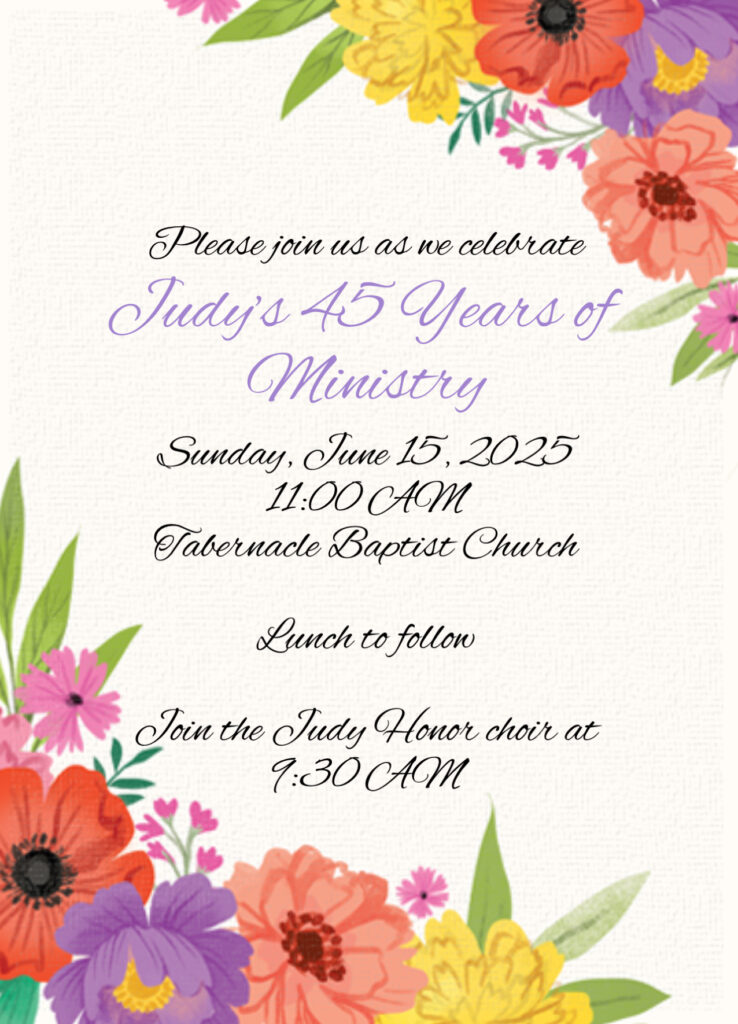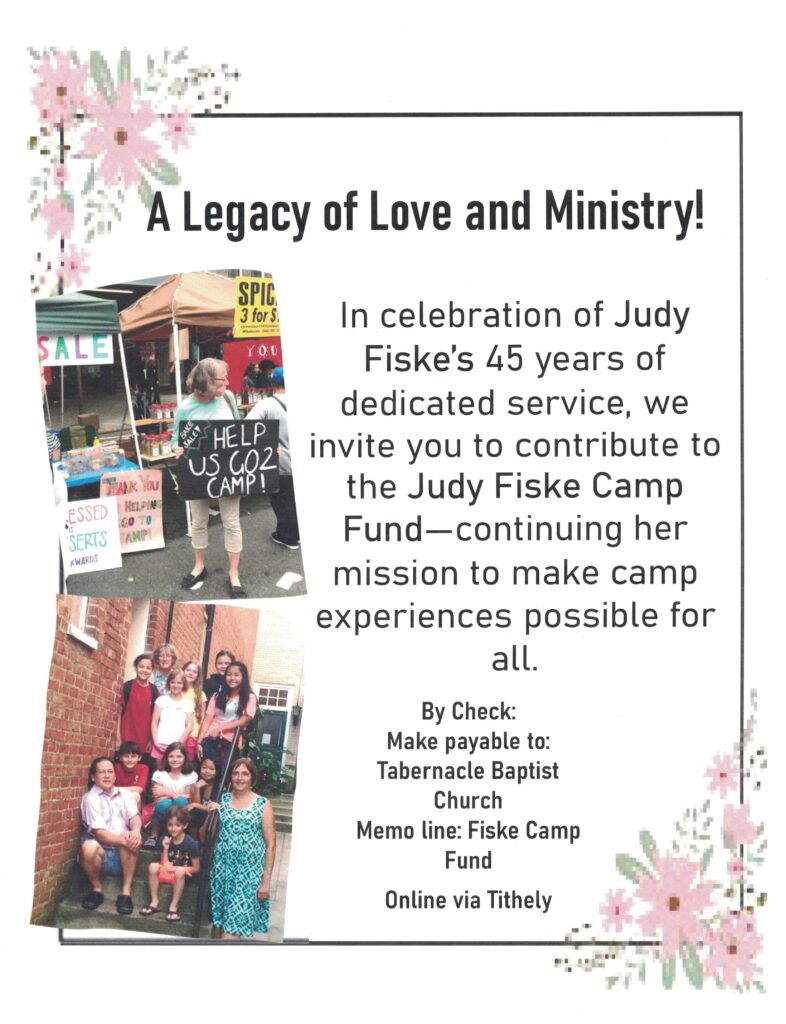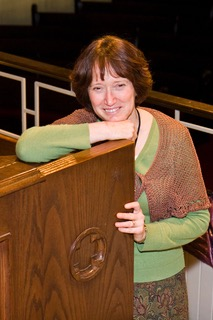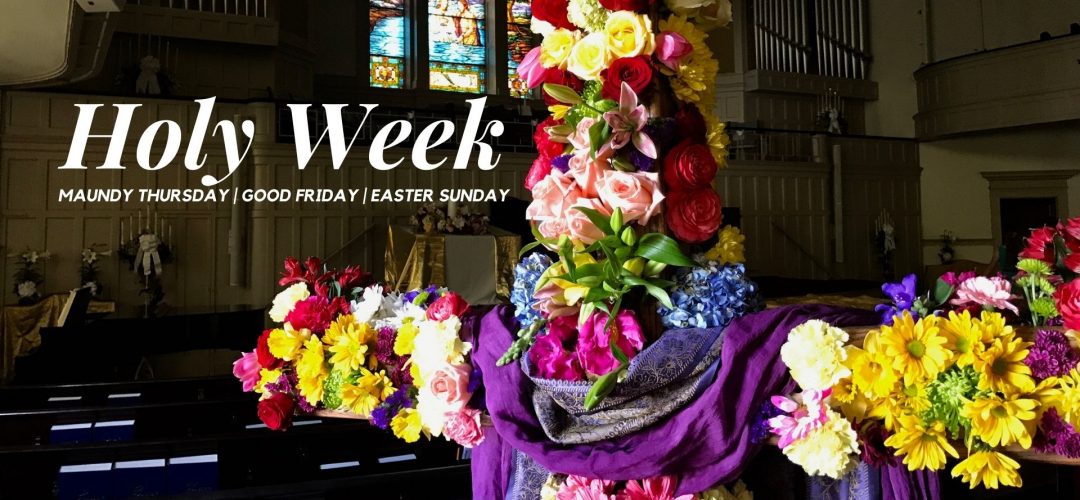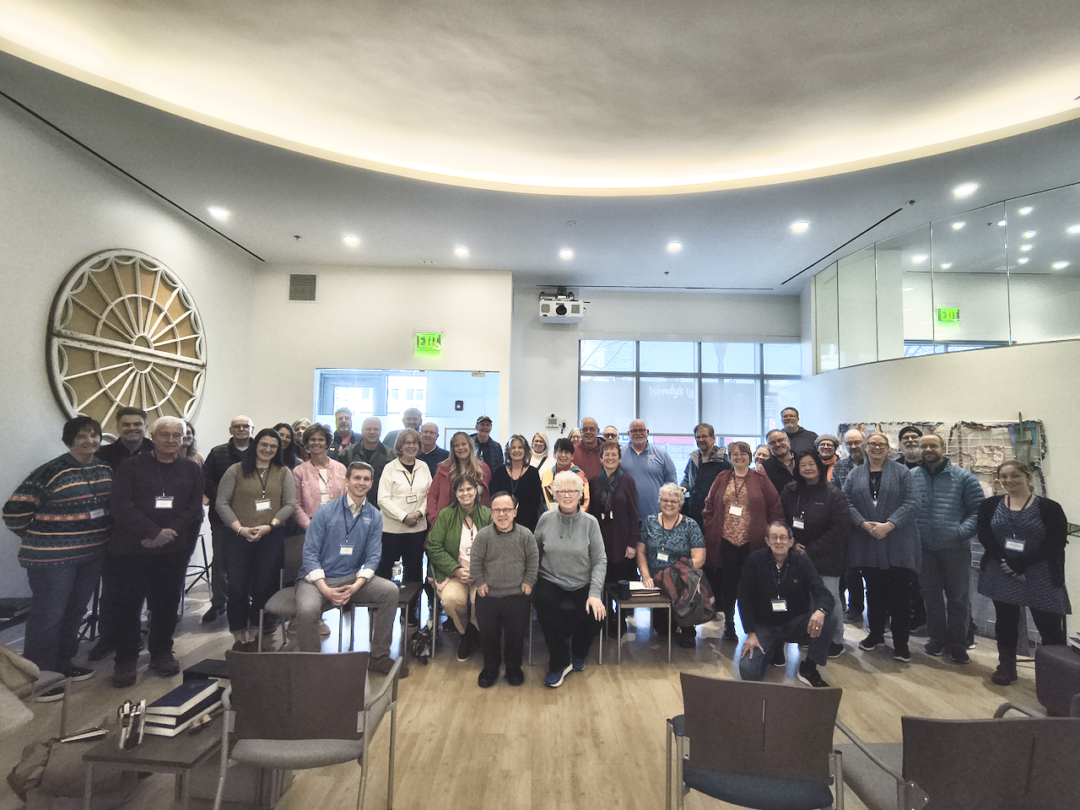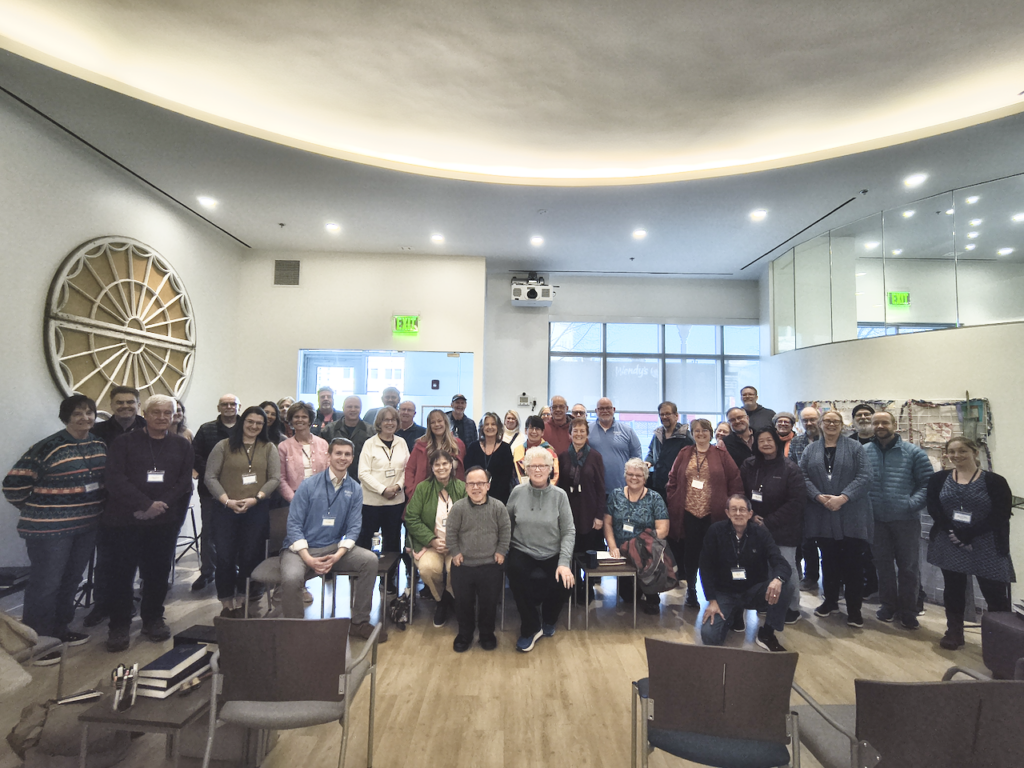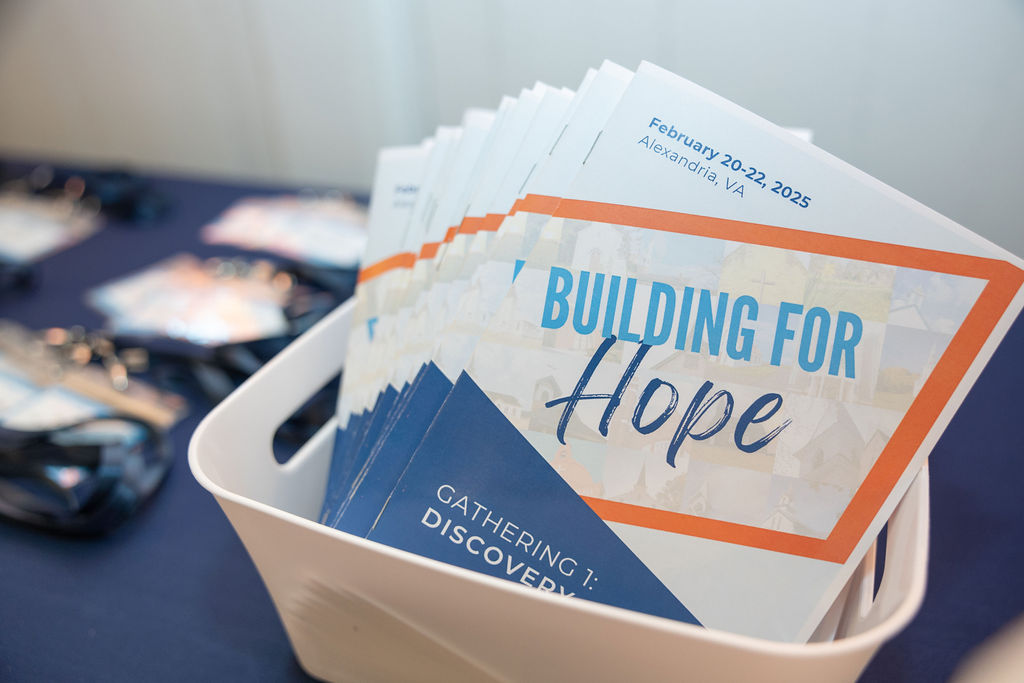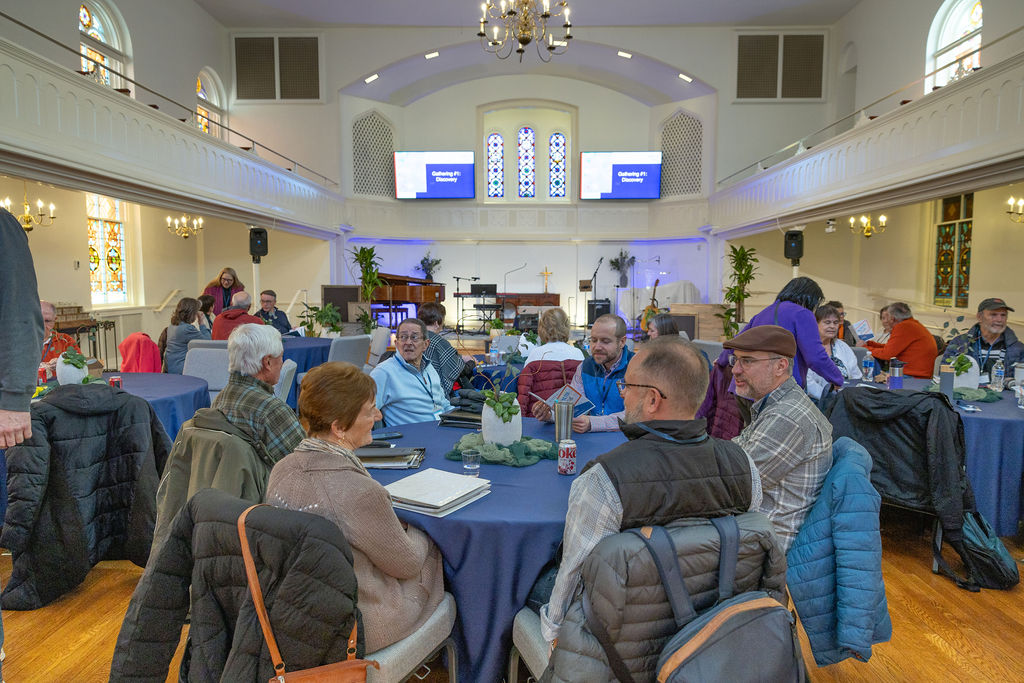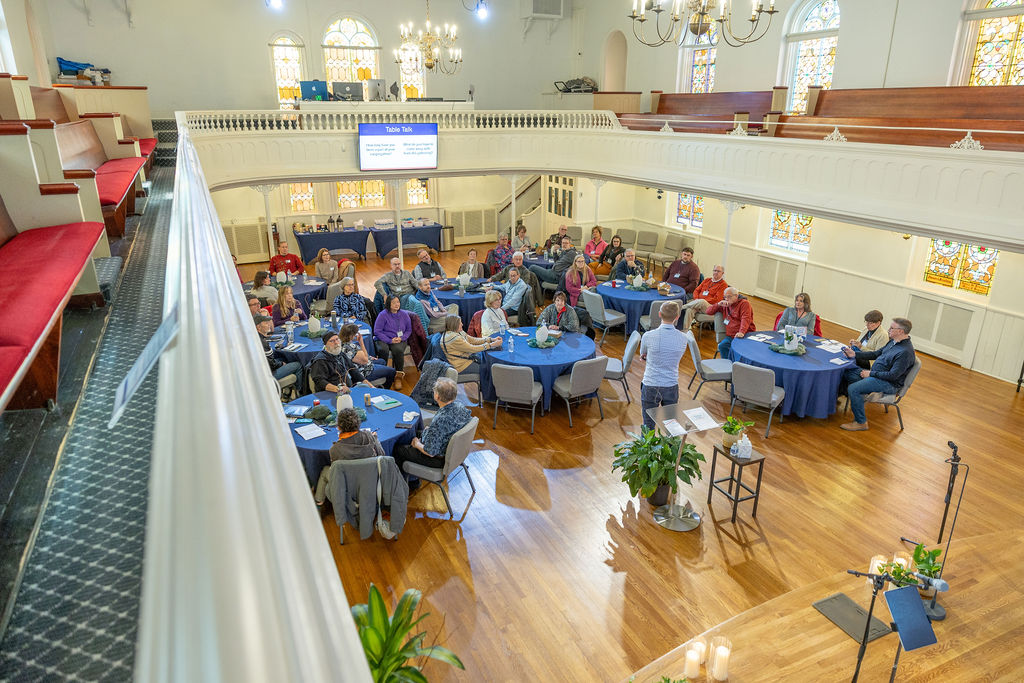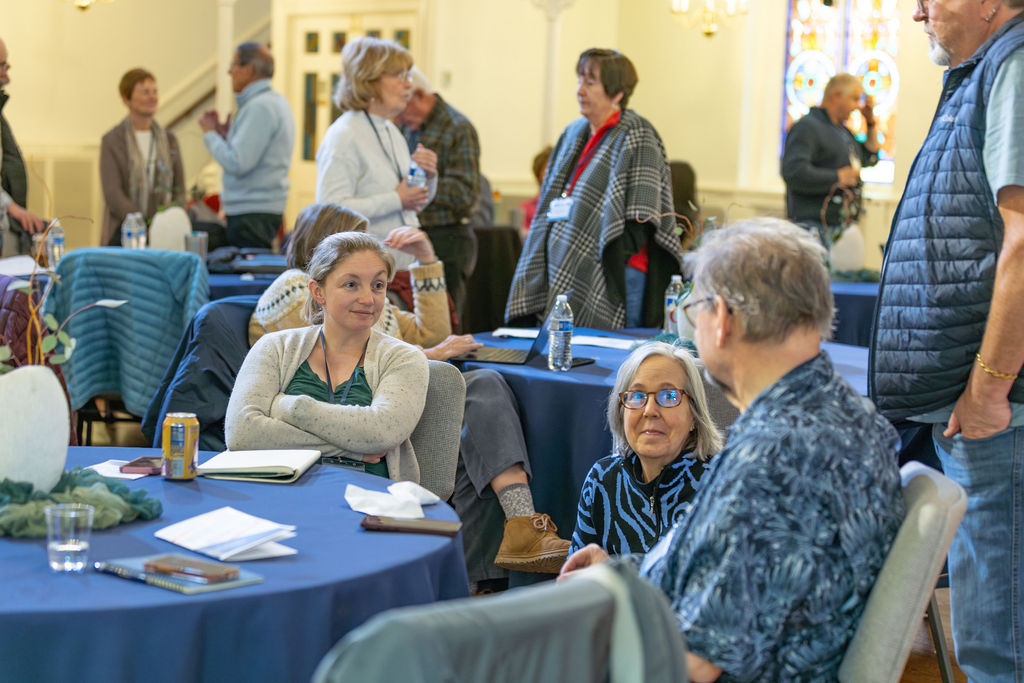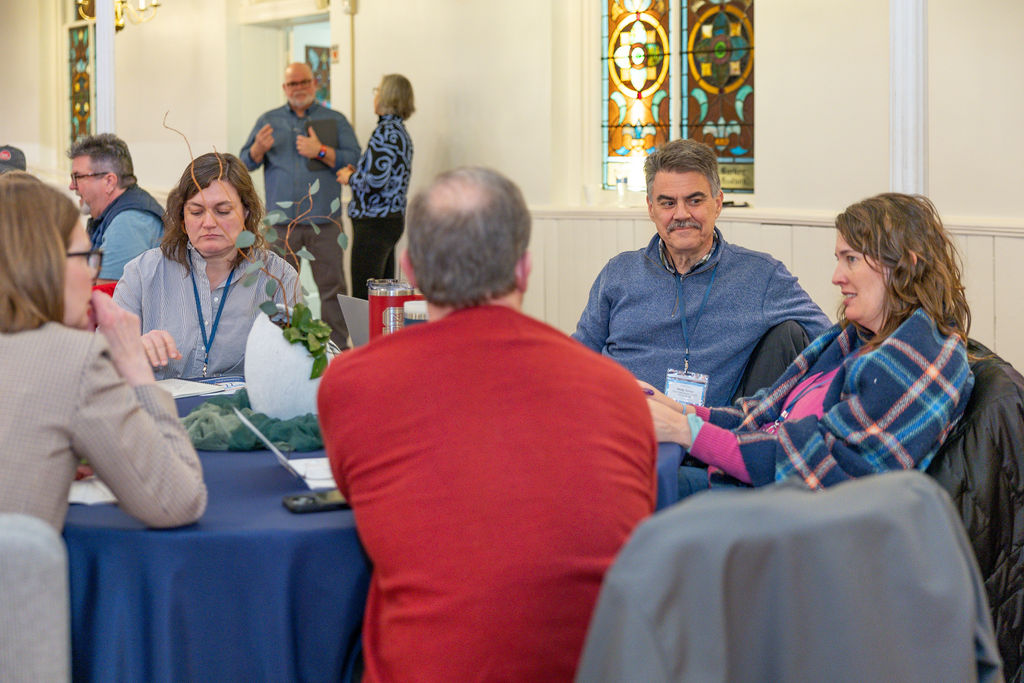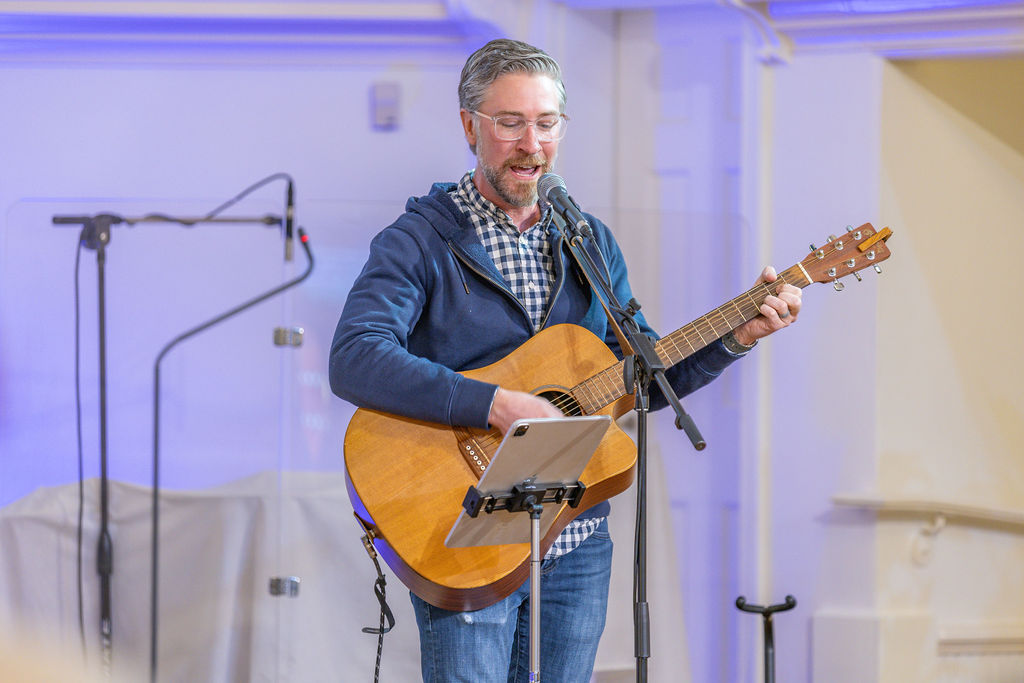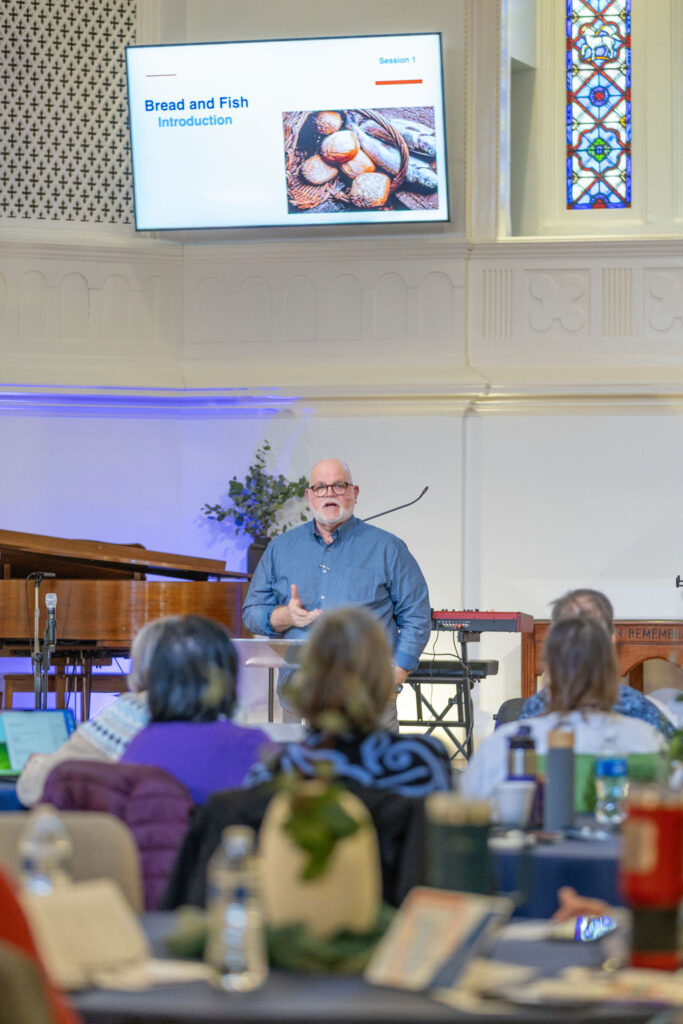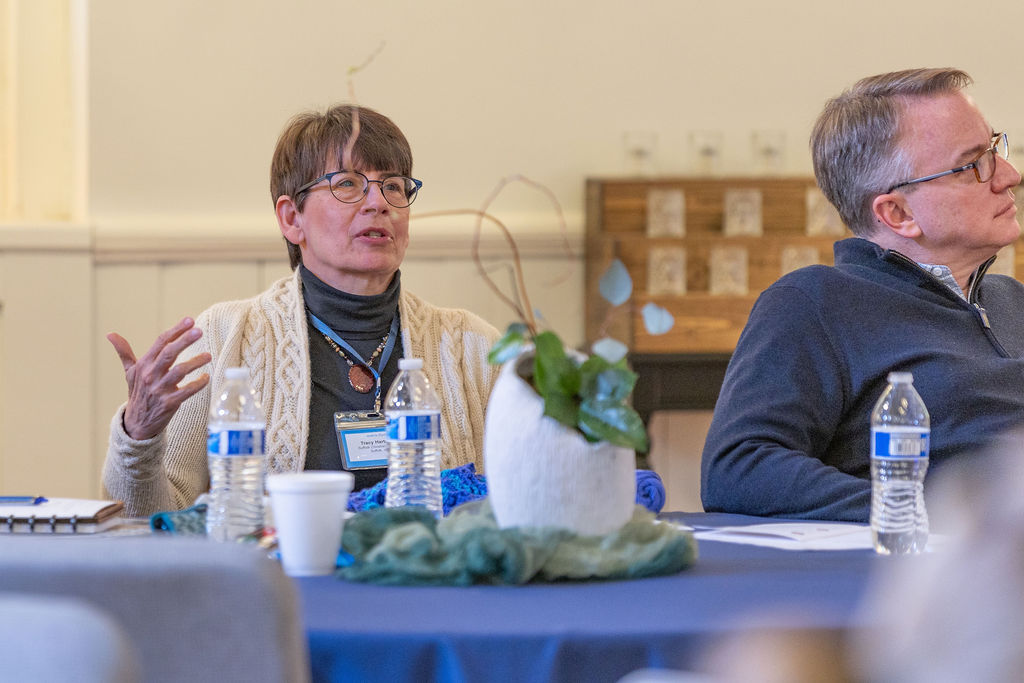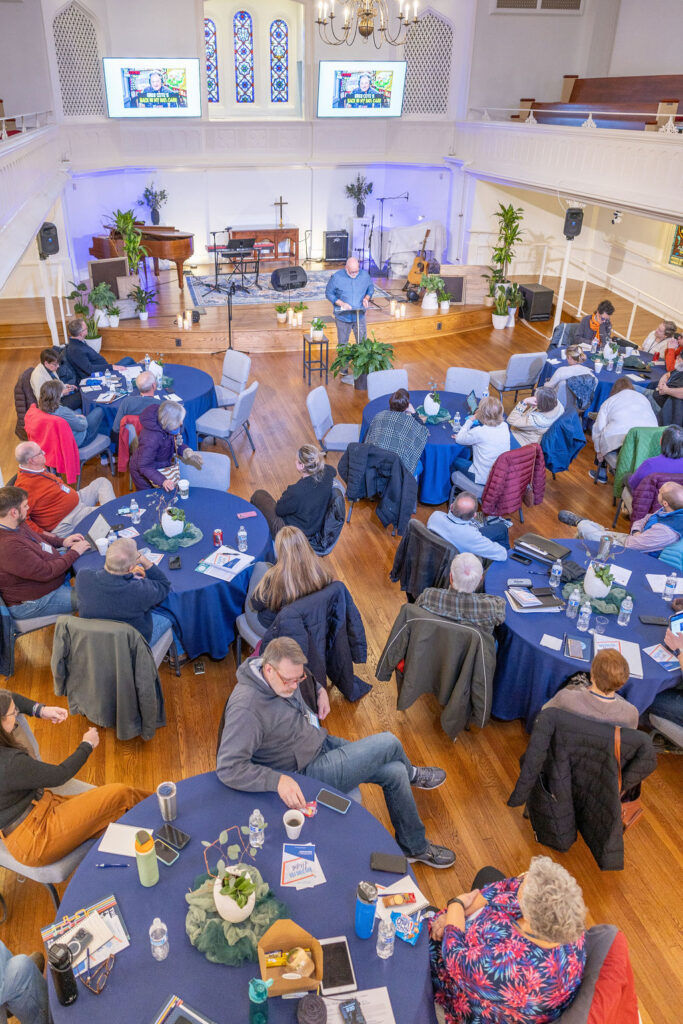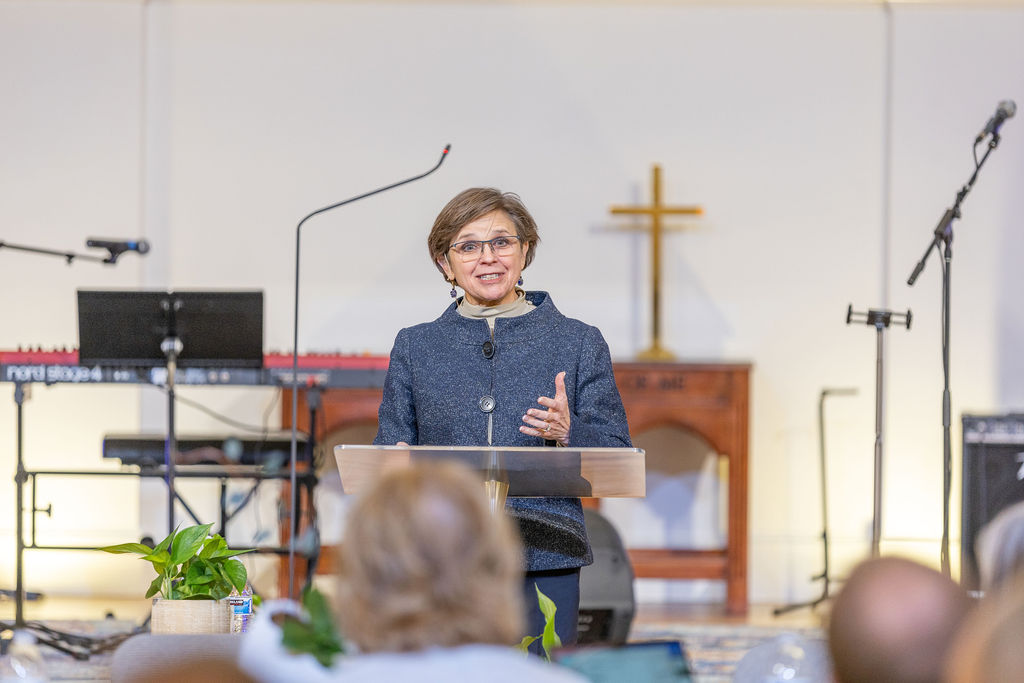A Word of Gratitude and Grace
This is a sacred season in the life of our church—one filled with gratitude, memory, and the faithful work of transition. While we have walked with others through retirement before, we have never experienced a transition quite like this—Judy Fiske retiring after 45 years of continuous ministry within the life of Tabernacle. That reality calls for deep care, deliberate attention, and shared grace.
First and foremost, we are grateful for Judy—for her decades of faithful, life-giving ministry, and for the humility and strength with which she is walking this transition. We also extend our deep gratitude to Judy’s family, who have walked alongside her and made sacrifices so that she could serve, lead, and thrive in ministry here for so many years.
We are also deeply thankful for the staff, the Personnel Committee, the Deacons, the many individuals who serve within the music ministry, and the countless others who have helped guide this process in quiet, faithful ways. And we are grateful for you—the congregation—for your flexibility, support, and commitment to this community.
Let’s continue to move forward in trust—trust in God, trust in one another, and trust in the unfolding future that awaits us. This is a moment to listen well, to show up generously, and to extend the same grace we’ve received. Together, we make the road by walking—and we do so as a people shaped by love, memory, and hope.
When Will Judy Retire from Staff?
Judy’s final day as a staff member will be Sunday, June 15. That morning, we will gather for worship as usual, followed by a church-wide celebration and reception in recognition of her 45 years of ministry.
We are indebted to Terry and Nathan, along with others, for their leadership in planning this celebration on behalf of the congregation.
After June 15, Judy’s staff email and Basecamp account will be deactivated as part of a healthy and respectful staff transition. We encourage you to remain in touch by using her personal email or phone number.
Why Is Judy Stepping Away This Summer, and What Will Her Reentry into Church Life Look Like?
With Judy’s staff role concluding on June 15, we have committed together to a 90-day period of intentional space (June 15–September 15). During this time, Judy will step back from participating in worship, attending church events, and engaging in the structured rhythms of church life.
This decision wasn’t made lightly. It reflects a shared desire—for Judy, for staff and church leaders, and for the congregation—to move through this transition with intention and grace. After 45 years of faithful, life-giving, and deeply rooted ministry, Judy’s role has become inseparable from the day-to-day fabric of Tabernacle. This pause is a necessary invitation to everyone involved—to acknowledge what has been, and to begin making room for what’s next.
Rather than trying to hold onto familiar patterns, we’re choosing to create space. This gives Judy a chance to breathe, reflect, and rest. It also allows the staff and church leaders to settle into new rhythms, and the congregation to begin embracing this significant shift in identity and practice.
Importantly, stepping back from church life does not mean stepping back from friendship and community. Judy has been part of this congregation for decades, and many of her closest relationships are with people in this church. It’s entirely natural—and welcomed—that she may continue connecting personally with friends over the summer. She is also looking forward to some well-earned freedom and rest—worshiping with her husband, Eric, at First English Lutheran Church, spending time worshipping with other friends throughout Richmond, and simply having the ability to choose how to spend a Sunday morning—something she hasn’t had in all of her adult life.
While Judy will not be participating in worship or formal church life over the summer, she will have access to the building and the organ for private practice. This access supports her ongoing musicianship and respects the deep connection she holds with the instrument. These moments will be personal and not connected to any public or staff responsibilities. They are also in keeping with the spirit of the 90-day period of intentional space.
In September, Judy will reenter church life first as a fellow worshiper—taking her place in the pews and worshiping alongside others. From there, she and church leaders will thoughtfully discern what further involvement might look like, including musical leadership or service in new ways.
There may also be rare and meaningful moments during the summer—such as baptisms or ordinations—where Judy’s presence may feel appropriate and welcomed. Any such invitations will be approached with great care and in full alignment with the spirit of this transition.
Key points:
- Judy will not participate in worship, events, or structured service roles during the summer (June 15–Sept 15).
- The 90-day period is a deliberate pause that honors both the depth of her ministry and the need for healthy transition.
- This pause does not exclude personal connection—Judy may continue informal time with friends in the congregation.
- She looks forward to worshiping with Eric at First English Lutheran, connecting and worshipping with friends around Richmond, and simply having the freedom to choose how to spend a Sunday.
- In the fall, Judy will return first as a fellow worshiper; additional involvement will emerge through shared discernment.
What Does the Title ‘Organist Emerita’ Mean, and Will Judy Play the Organ Again?
The Deacons have unanimously affirmed the decision to honor Judy with the title Organist Emerita, a permanent and honorary designation offered in deep gratitude for her 45 years of faithful, creative, and spiritually grounded leadership. The title reflects the congregation’s enduring appreciation for the role Judy has played in shaping the worship life of Tabernacle Baptist Church.
This is not a staff position and does not carry expectations related to responsibilities, compensation, or weekly participation. Rather, it is a visible and lasting tribute to Judy’s legacy and continued presence within the church community.
The Deacons will formally present this honor on behalf of the congregation during the worship service or luncheon on June 15. Judy’s name and honorary title will also appear in places where staff names are typically listed—such as the church bulletin, website, and other communications—as an ongoing public expression of appreciation.
Looking ahead, Judy and church leaders will enter into a mutual dialogue this fall about the possibility of her serving in a part-time or contractual organist role. That conversation will unfold with care and clarity, shaped by the needs of the congregation and Judy’s own sense of calling. It is important to note that Judy will first return in the fall simply as a fellow worshiper, reentering church life gently and without expectations.
Key points:
- The Deacons have unanimously approved honoring Judy as Organist Emerita.
- The title is permanent and honorary, not a continuation of staff responsibilities.
- It will be formally presented during the worship service or luncheon on June 15.
- Judy’s title will appear in the church bulletin, website, and other formal communications.
- A mutual dialogue between Judy and church leaders will begin this fall regarding any future organist role.
- Judy will first return to church life as a fellow worshiper, without formal responsibilities.
Who Will Plan Worship and Lead Music Following Judy’s Retirement?
Beginning June 16, Pastor Sterling Severns will take primary responsibility for worship planning, at the request of the Deacons. He will work in collaboration with a team of staff and congregants to shape meaningful, theologically grounded worship for the months ahead.
Judy will no longer be involved in worship planning after June 15. Her contributions in this area have shaped the spiritual life of Tabernacle in lasting ways. We are deeply grateful for her years of pastoral musicianship and faithful preparation.
The worship team recognizes that this next chapter is one of discernment and adaptability. While the organ will not be used every Sunday, it will continue to be a valued part of our worship life—used less frequently in the summer, and more regularly in the fall.
The church is also exploring the possibility of contracted musicians to support worship. These conversations are ongoing and are rooted in care for spiritual depth, relational health, and financial sustainability.
Key points:
- Sterling Severns will lead worship planning, in collaboration with staff and congregants.
- Judy will no longer plan worship after June 15.
- Worship will continue to grow through creativity, prayer, and shared leadership.
- Organ music will remain a part of our worship life—less frequent in summer, more regular in fall.
- The use of contracted musicians will require thoughtful review.
What Is Judy Focused on During Her Final Month on Staff?
In this final month, Judy is focusing on the significant and necessary task of preparing her materials for transition. After decades of ministry, she has gathered a substantial collection of worship resources, books, music, and discipleship materials. These have long supported the life of the church.
- A staging space in the former youth room is being used to sort these items. Organ music is being moved into a set of filing cabinets near the choir loft. Several spaces are being cleared so they can be cleaned and refreshed, including:
- The choir loft
- The front pews of the sanctuary
- Judy’s office
- The former music library, which the youth will begin using as their meeting space in June
- In the choir room, Judy’s personal items will be moved to the staging room prior to departure, while materials that are already organized—such as those under the risers and on the bookshelves—will remain in place and be reviewed at a later time as part of the church’s broader facilities discernment process.
- Other small storage areas throughout the building
- Seeing familiar spaces cleared out offers an emotional and visual cue—reminding us that Judy’s transition is real and significant. This makes room for gentler expectations around her return and helps us all move forward with grace.
- All clearing and organizing that needs to happen before Judy’s departure will take place between now and June 15. This includes removing materials from several key spaces and relocating items into the staging room. Once Judy retires from staff, she will not continue this work over the summer. The contents of the staging room and remaining materials in the choir room will be left as they are until after the 90-day period of intentional space, at which point Judy will resume sorting and decision-making in those areas—beginning after September 15.
Key points:
- Judy is sorting worship, music, and discipleship materials in preparation for retirement.
- A staging room is being used; organ music is moving to filing cabinets.
- Several church spaces are being cleared to support this transition.
- In the choir room, personal items will be addressed; other organized materials may remain.
- The work of gathering and placing items in the staging room will be completed by June 15.
- Judy will not work on this during the summer, but will resume after Sept. 15.
- Volunteers are needed—with and under Judy’s guidance.
What Is Judy’s Role in Music Camp or Clue Camp This Year?
As part of her transition, Judy will not be attending Music and Worship Arts Camp at Eagle Eyrie or Clue Camp in New York City this summer. She has offered some behind-the-scenes support for Music Camp, including supplies and encouragement.
We’re grateful for the many members of the congregation who are stepping into leadership and helping continue these important ministries.
Key points:
- Judy is not attending Music Camp or Clue Camp this summer.
- She has offered behind-the-scenes support for Music Camp.
- We’re grateful to those leading and continuing these ministries.
How Can I Help During This Transition?
There are many ways you can support Judy, the staff, and the church during this important season. With a great deal to do in the next month, your help is both needed and deeply appreciated.
Here are a few meaningful ways to get involved:
- Volunteer to help move and organize music, books, and personal items before June 15.
- Let Nathan and Terry know if you’re available to help with the June 15 retirement celebration.
- Offer encouragement to Judy and others walking closely with her during this transition.
- Pray for wisdom, tenderness, and spiritual clarity for all involved.
- Be present on June 15 as we celebrate and give thanks together.
- Hold space for one another—this is a tender time, and your grace matters.

